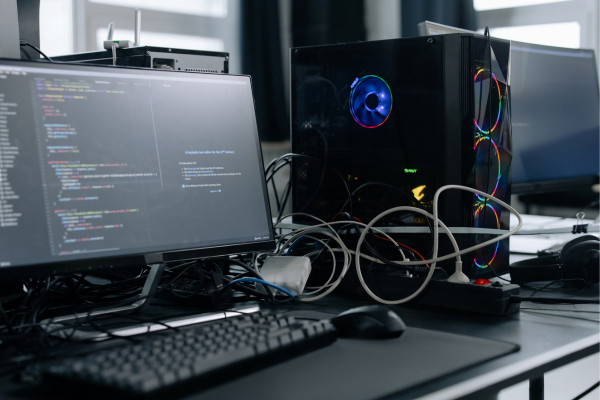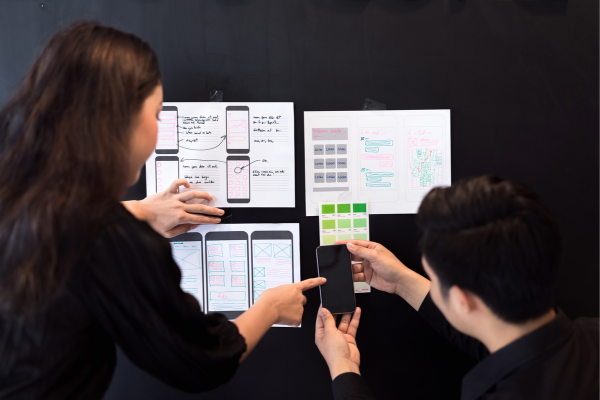Table of Contents
- Why Following Software Engineering Trends Is Crucial
- Key Software Engineering Trends to Watch
- 1. Artificial Intelligence and Machine Learning
- 2. Quantum Computing: The Next Frontier
- 3. Low-Code and No-Code Development
- 4. Edge Computing and IoT Expansion
- 5. Building a Cybersecurity-First Culture
- 6. Sustainable and Ethical Software Practices
- 7. The Evolution of DevOps and Automation
- 8. Hyper-Personalization and Adaptive Interfaces
- Skills That Will Define the Next Decade
- How Bay Atlantic University Equips Future-Ready Software Engineers
- FAQ: Preparing for the Future of Software Engineering
The field of software engineering is evolving rapidly, fueled by emerging technologies and changing industry demands. From artificial intelligence (AI) to cloud computing, the trends shaping the next decade promise both exciting opportunities and significant challenges for engineers. For students and professionals alike, understanding these software engineering trends is crucial for staying relevant in a world where adaptability is key.
Why Following Software Engineering Trends Is Crucial
In every field, staying aligned with industry trends is the key to long-term success. It helps professionals anticipate shifts, adopt new tools, and maintain a competitive edge in a crowded job market. For aspiring and current software engineering students, understanding these trends is even more critical. It’s not just about learning to code, it’s about preparing to innovate in a world where technology and business needs evolve at lightning speed.
Whether you’re exploring a career in software engineering or already on your academic journey, being trend-aware ensures you graduate with skills that are in demand, not outdated.
The software engineering landscape has always been dynamic, but today’s pace of change is unprecedented. As digital transformation reshapes industries, software engineers are increasingly called upon to build systems that are not only functional but also intelligent, secure, and sustainable.
The U.S. Bureau of Labor Statistics projects a 17% growth in software development jobs from 2023 to 2033, yet the expectations for what a software engineer delivers are also evolving. Staying ahead of trends isn’t optional—it’s essential for building a resilient and future-ready career.
Key Software Engineering Trends to Watch
1. Artificial Intelligence and Machine Learning
Yes, AI and ML have already transformed software development, but the next decade will see these technologies becoming even more integral.
-
AI-Augmented Development: Tools like GitHub Copilot and OpenAI’s Codex are automating code generation, debugging, and testing. While they save time on repetitive tasks, engineers still play a critical role in ensuring code quality and solving complex problems.
-
Smarter Applications: Industries from healthcare to finance are embedding ML for personalization, predictive analytics, and automation.
-
Essential Skills: Engineers proficient in TensorFlow, PyTorch, and Keras will remain in high demand.
2. Quantum Computing: The Next Frontier
In simple terms, quantum computing uses the principles of quantum mechanics to process information in ways that classical computers cannot, opening doors to breakthroughs in cryptography, optimization, and complex simulations. Quantum computing promises a leap in computational power, enabling solutions to problems once considered unsolvable.
-
Security Implications: Existing encryption could become obsolete, prompting demand for quantum-resistant algorithms.
-
Industries Impacted: Logistics, pharmaceuticals, and climate science are poised to benefit from quantum simulations.
-
What to Learn: Familiarity with quantum programming tools like Qiskit and Cirq will give engineers an edge as the technology matures.
3. Low-Code and No-Code Development
Not a software developer yet? Don’t be so sure. Low-code and no-code platforms are democratizing software creation.
-
For Businesses: They enable rapid prototyping and faster deployment without deep coding expertise.
-
For Engineers: Professionals will still be needed to handle complex customizations, scalability, and integrations.
-
Trend Insight: Mastering how to extend these platforms with APIs and custom modules can make engineers more versatile, and allow them to allocate basic tasks to non-engineers.
4. Edge Computing and IoT Expansion
With the rise of Internet of Things (IoT) devices and real-time data needs, edge computing has emerged as a key trend.
-
Real-Time Processing: Autonomous vehicles, smart cities, and telemedicine rely on instant data handling at the edge.
-
Security and Efficiency: Localized processing enhances data privacy and reduces latency.
-
What to Learn: Engineers need skills in distributed systems and familiarity with IoT development platforms.
5. Building a Cybersecurity-First Culture
With cyber threats escalating worldwide, secure software development is no longer optional but fundamental.
-
Shift Left Security: Security is being integrated earlier in the development lifecycle to catch vulnerabilities before they escalate.
-
Zero Trust Architectures: Modern systems assume no user or device is automatically trusted, making robust authentication and authorization essential.
-
AI-Enhanced Defense: Machine learning models are increasingly deployed to spot anomalies and predict threats in real time, strengthening defense mechanisms.
Software engineers who prioritize security from day one will be in high demand as companies seek to protect sensitive data and maintain user trust.
6. Sustainable and Ethical Software Practices
As environmental and ethical concerns take center stage, software engineers are starting to ask tough questions about their own work: How does the code I write affect the planet? What kind of legacy will my applications leave behind?
-
Green Coding: Writing cleaner, more efficient code helps reduce energy consumption and environmental footprint.
-
Optimizing Cloud Infrastructure: Developers are designing systems that minimize carbon emissions from cloud services.
-
Responsible AI: Transparent, fair, and bias-free algorithms are no longer a nice-to-have but they are a necessity for building public trust.
The push for sustainable development is turning ethical engineering into a core competency for the next generation of professionals.
7. The Evolution of DevOps and Automation
DevOps has transformed workflows, but the next wave of automation is pushing boundaries even further.
-
Infrastructure as Code (IaC): Tools like Terraform and Ansible enable developers to manage infrastructure efficiently and reliably.
-
Automated CI/CD Pipelines: Continuous integration and delivery practices are accelerating release cycles without sacrificing quality.
✅ Request information on BAU's programs TODAY!
-
Emerging Roles: Site Reliability Engineers (SREs) are becoming essential, ensuring systems remain resilient in highly automated environments.
Mastering these practices empowers engineers to deliver robust software faster and with fewer errors.
8. Hyper-Personalization and Adaptive Interfaces
Users now expect software that feels personal and intuitive across every device they own.
-
Data-Driven Design: Applications will increasingly analyze user behavior to tailor interfaces and experiences in real time.
-
Cross-Device Seamlessness: Developers must build ecosystems where apps function flawlessly across smartphones, desktops, wearables, and more.
-
AI-Powered Interfaces: Expect more dynamic UIs that adapt to user preferences, habits, and even context.
This trend highlights a shift from static systems to software that learns and evolves with its users.
Skills That Will Define the Next Decade
Keeping pace with these trends requires more than awareness—it demands a new toolkit. The software engineers who thrive in the next decade will combine cutting-edge technical expertise with the human skills needed to navigate an ever-changing landscape.
Here are the key skills that will define success in the future of software engineering:
Technical Skills
-
AI and ML frameworks (TensorFlow, PyTorch): Essential for building intelligent systems and automating complex processes.
-
Cloud-native development (AWS, Azure, Google Cloud): Crucial for creating scalable, resilient applications in today’s cloud-first world.
-
Cybersecurity best practices: As threats grow, secure coding and system design are critical.
-
Proficiency in languages like Python, Rust, and Go: Staying versatile with modern programming languages keeps engineers relevant.
-
DevOps tools (Docker, Kubernetes, Jenkins): Streamlines development and operations for faster, more reliable software delivery.
-
Problem-solving and critical thinking: Vital for navigating complexity and finding innovative solutions.
-
Interdisciplinary collaboration: Working effectively across diverse teams and industries.
-
Adaptability and continuous learning: Staying ahead in a field where change is constant.
-
Business acumen: Aligning technical decisions with organizational goals to deliver impactful solutions.
How Bay Atlantic University Equips Future-Ready Software Engineers
As a STEM focused university, we understand that thriving in this dynamic field requires more than technical skills. Our software engineering programs prepare students to:
✔ Work on hands-on projects with real-world impact
✔ Benefit from guaranteed remote internships
✔ Gain mentorship from industry-experienced faculty
✔ Access cutting-edge tools and resources in Washington, D.C.
Whether you’re just beginning your journey or looking to sharpen your expertise, BAU provides the foundation and flexibility you need to grow into the software engineer of tomorrow.
Learn more about our programs and how they prepare you for the challenges and opportunities of the next decade.
FAQ: Preparing for the Future of Software Engineering
Will AI replace software engineers?
No. AI enhances productivity but lacks human creativity and problem-solving needed for complex software solutions.
Which programming languages are most future-proof?
Python, Rust, Go, and JavaScript remain top choices due to their versatility and relevance to emerging technologies.
How important is cybersecurity knowledge?
Critical. Secure coding and understanding threat models are now baseline skills for every engineer.
Do I need cloud computing expertise?
Yes. Cloud-native skills are essential for building scalable, modern applications.
What’s the role of soft skills in software engineering?
As teams become more global and interdisciplinary, communication and adaptability are just as crucial as technical ability.














